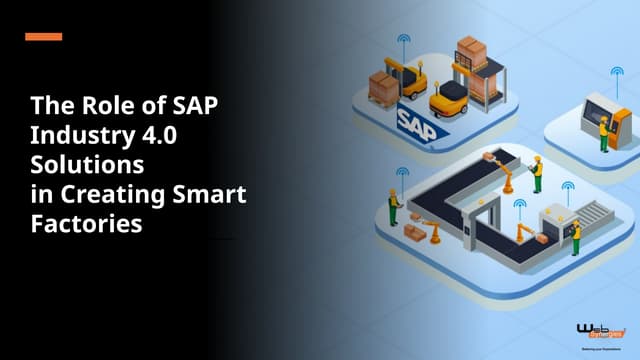The journey toward a smart factory is no longer a distant vision; it is a strategic necessity for modern manufacturers. As industries evolve through automation, data integration, and intelligent technologies, the pressure to transition from traditional operations to smart factory environments is growing. However, the path is complex and demands precise planning, execution, and adaptability. This is where SAP advisory services and SAP managed services come into play—providing the framework, tools, and expertise to ensure a smooth and value-driven transformation.
Understanding the smart factory landscape
Smart factories are defined by their ability to leverage real-time data, automated workflows, and connected systems to drive efficiency, reduce errors, and make data-backed decisions. However, shifting toward this model is not just about implementing new technology—it involves a complete overhaul of legacy systems, process integration, and workforce alignment.
SAP advisory services help manufacturers evaluate their current state, identify transformation gaps, and align strategic goals with achievable milestones. These services, from process redesign to infrastructure optimization, lay the foundation for digital maturity.
The role of SAP advisory services in transformation planning
Creating a transformation roadmap is one of the most critical steps in smart factory enablement. This involves identifying bottlenecks, redefining KPIs, and prioritizing investments.
With SAP advisory services, companies gain expert guidance on:
Conducting digital readiness assessments
Designing scalable system architectures
Selecting the right SAP modules and tools
Aligning business processes with smart factory principles
These tailored consultations help minimize risk and ensure that every step toward transformation is guided by data, experience, and strategic clarity.
How SAP managed services ensure seamless execution
Once a roadmap is in place, execution becomes the next challenge. Implementing SAP tools, migrating data, and managing complex integrations require high technical expertise and operational agility.
This is where SAP managed services add measurable value. These services support day-to-day operations while enabling innovation, ensuring the transformation does not disrupt critical business functions.
With SAP managed services, organizations benefit from:
24/7 technical monitoring and support
Timely system upgrades and patch management
Proactive issue resolution
Efficient data management and security
Such services keep SAP systems running efficiently and free up internal teams to focus on high-impact initiatives.
Accelerating time to value through expert support
Speed is crucial when adopting smart factory technologies. The longer the transition, the greater the operational gaps and missed opportunities.
By combining SAP advisory services with SAP managed services, manufacturers reduce implementation timelines, increase user adoption, and accelerate ROI. The integrated approach ensures continuous optimization, system alignment, and real-time adaptability—vital in the fast-changing manufacturing landscape.
Conclusion: Partnering for long-term digital success
Smart factory transformation is a long-term journey that demands precision, collaboration, and reliable expertise. Organizations that leverage SAP advisory services to plan effectively and rely on SAP managed services for seamless execution are better positioned to thrive in this new manufacturing era.
To remain competitive and responsive to change, partnering with experts who understand business processes and SAP technologies is essential. Bridging the digital gap requires more than tools—it requires a strategy supported by the right services every step of the way.
Enjoyed this? Share this post with fellow fans and influencers, and be sure to check back regularly for the latest updates, insights, and news on all things simpcity!

